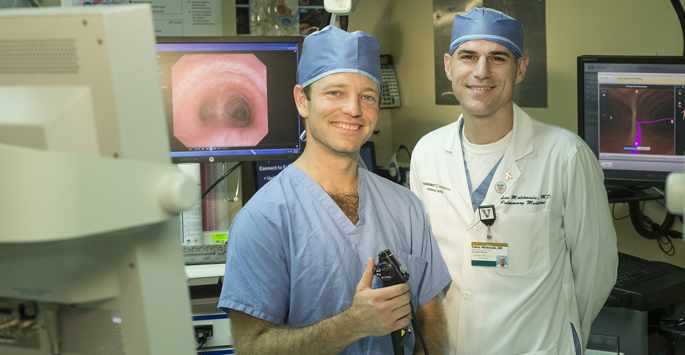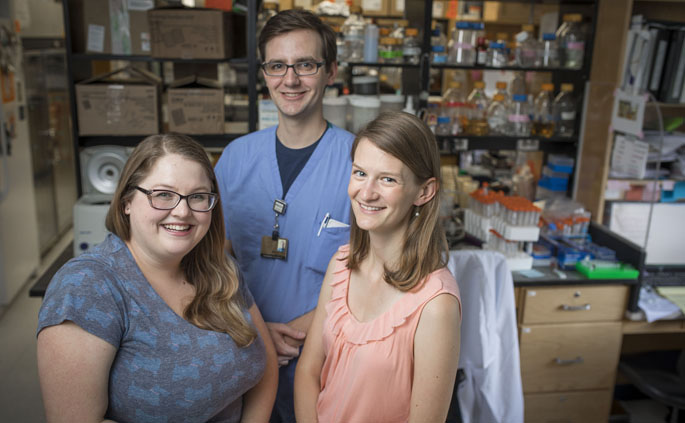NIH Funding
-

Study tracks impact of NAS on state Medicaid programs
In the United States, one infant is born every 15 minutes with withdrawal symptoms after being exposed to opioids before birth, according to a new study published in the journal Pediatrics. Read MoreMar 23, 2018
-

New imaging approach offers unprecedented views of staph infection
A new integrated imaging approach makes it possible to probe the molecules involved in invasive infections and can be broadly applied to any health or disease state. Read MoreMar 15, 2018
-

Study helps map signaling system in brain linked to ASD
Researchers at Vanderbilt University have worked out part of the “wiring diagram” of a signaling system in the brain that has been linked to autism spectrum disorder (ASD). Read MoreFeb 8, 2018
-

Study finds higher death rates in poor neighborhoods
Living in an economically disadvantaged neighborhood is likely to lead to death at an earlier age, especially among African-Americans, new research shows. The death rate is even more pronounced among disadvantaged individuals with unhealthy lifestyle habits. Read MoreJan 18, 2018
-

Asthma study may point to potential new therapeutic approach
New findings from Vanderbilt suggest that blocking the migration of cells involved in asthma may represent a new approach for treating the respiratory condition. Read MoreJan 4, 2018
-

VIGH fellowship training program lands NIH renewal
The Vanderbilt Institute for Global Health (VIGH) has received a five-year, $4.66 million renewal grant from the National Institutes of Health (NIH) to continue a program established in 2012 with Emory, Cornell and Duke universities that is training the next generation of leaders in global health research. Read MoreDec 7, 2017
-

Protocol reduces antibiotic use prior to cytoscopy
A study from Vanderbilt University Medical Center (VUMC) by Justin Gregg, MD, and colleagues demonstrates how a clinical protocol can help reduce unnecessary use of outpatient antibiotics. Read MoreDec 7, 2017
-

Research finds midlife women twice as likely as men to have asthma
In childhood, asthma is more common in boys than girls. But around the time of puberty, that picture reverses. By mid-life women are twice as likely as men to have asthma. Read MoreNov 28, 2017
-

Study may point to new treatment approach for ASD
Using sophisticated genome mining and gene manipulation techniques, researchers at Vanderbilt University Medical Center (VUMC) have solved a mystery that could lead to a new treatment approach for autism spectrum disorder (ASD). Read MoreNov 16, 2017
-

Liquid biopsies help reveal lung cancer mutations
Cancer investigators led by researchers at Vanderbilt-Ingram Cancer Center (VICC) have co-developed a liquid biopsy blood-based assay used to identify specific gene mutations associated with the development or relapse of small-cell lung cancer (SCLC). Read MoreNov 2, 2017
-

Team to develop steerable robotic needle for biopsies
Collaboration between a mechanical engineer at Vanderbilt University and a pulmonologist at Vanderbilt University Medical Center (VUMC) has resulted in a National Institutes of Health (NIH) R01 grant that will be used to develop a steerable robotic needle to safely biopsy hard-to-reach lung nodules. Read MoreOct 26, 2017
-

VIGH receives federal grants to fight kidney disease
Researchers in the Vanderbilt Institute for Global Health (VIGH) have received two new grants from the National Institutes of Health (NIH) aimed at reducing the risk of kidney disease in HIV-infected adults and improving the treatment of epilepsy in children in Nigeria. Read MoreOct 12, 2017
-

Excess dietary manganese increases risk of staph infection in heart
Too much dietary manganese — an essential trace mineral found in leafy green vegetables, fruits and nuts — promotes infection of the heart by the bacterium Staphylococcus aureus (“staph”). Read MoreSep 21, 2017
-

Study reveals how brain processes spatial hearing information
Scientists have known that the brain detects where sound comes from based on a couple of major cues — when the sound hits each ear (interaural time difference) and what the sound level is when it does (interaural level difference.) Less is known, however, about where and how that spatial hearing information is processed in the brain. Read MoreSep 7, 2017
-

Student’s summer research program honors her mother
As a teenager, Ashley Duhon realized she wanted to become a doctor so she could help people, like her mother, who suffer from medical complications due to type 1 diabetes. Read MoreJul 27, 2017
-

Study identifies protein’s role in chemotherapy resistance
Researchers at Vanderbilt University Medical Center (VUMC) have discovered a protein that may lead to a new way to prevent resistance and improve outcomes for patients whose cancers have mutations in the tumor suppressor gene BRCA2. Read MoreJul 20, 2017
-

Immune responses linked to cell’s recycling system
Autophagy is the cellular equivalent of trash pickup and recycling — it is a process by which proteins, protein aggregates and damaged cellular organelles are degraded in order to reuse nutrients and promote cellular metabolism. Read MoreJul 20, 2017
-

Team investigates antiviral that inhibits SARS, MERS
A new antiviral drug candidate inhibits a broad range of coronaviruses, including the SARS and MERS coronaviruses, a multi-institutional team of investigators reports this week in Science Translational Medicine. Read MoreJun 29, 2017
-

VU scientists report a way to calm the sepsis “storm”
Researchers at Vanderbilt University Medical Center (VUMC) have found a way to calm the “genomic storm” that triggers the often-lethal consequences of sepsis. Read MoreJun 22, 2017
-

VUMC lands renewal of Clinical and Translational Science Award
Vanderbilt University Medical Center (VUMC) has competed successfully for a second renewal of its Clinical and Translational Science Award (CTSA) by the National Institutes of Health (NIH). Read MoreJun 8, 2017